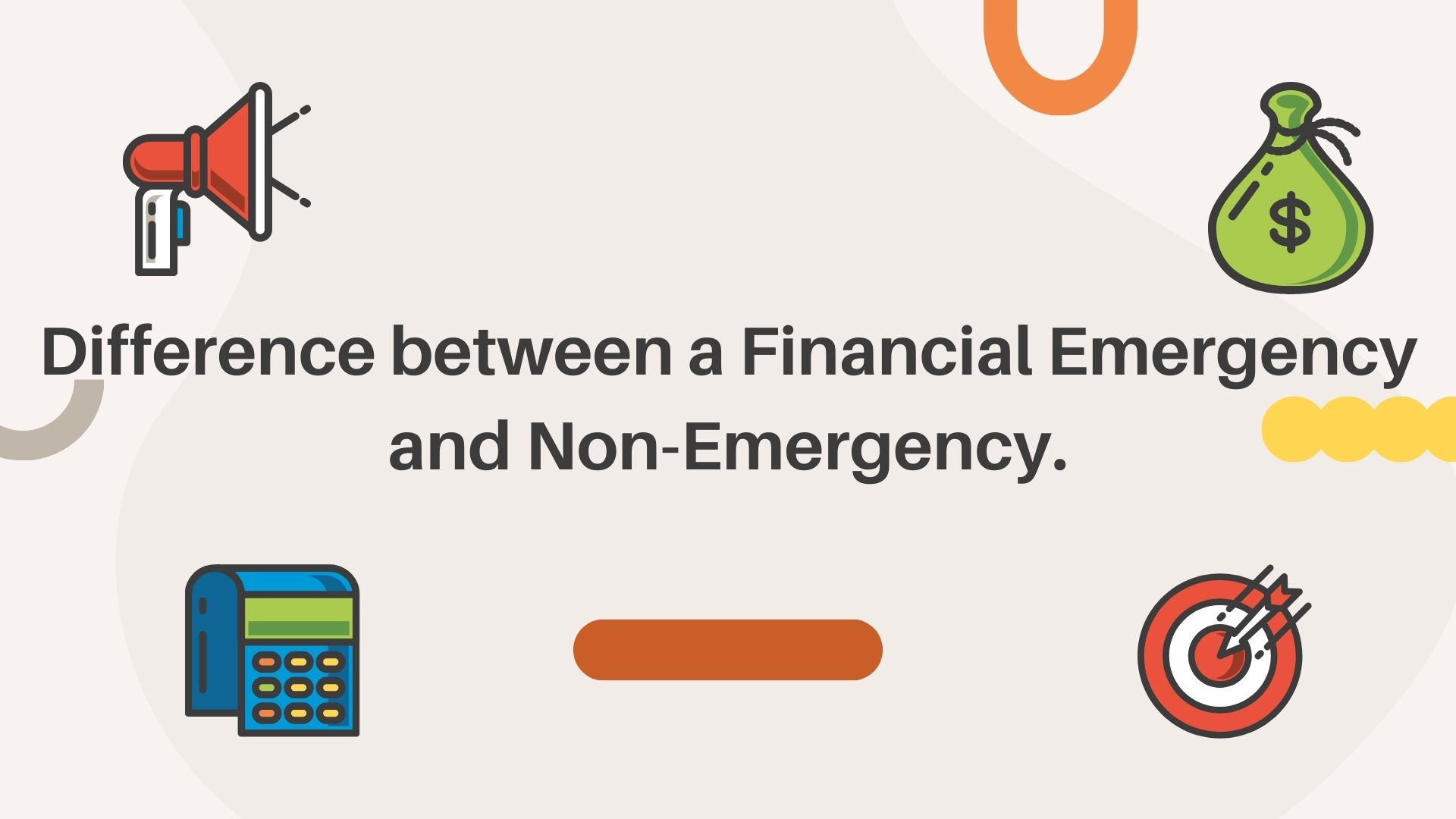We gladly started discussing Contrast the difference between a financial emergency and nonemergency that could cater to basic needs. In the way of life, our economic situation can drop due to progressively complicated shifts instantly, leaving us stranded amid possible financial stress. Another unavoidable truth is that a car breakdown, a leaky roof, or a health problem that pops up suddenly is not only irritating but also the harsh reality that everyone meets at one time or another. Nevertheless, whether we see the current financial stressor as an emergency worth taking alternatives or a pressing calamity worth taking full risks is the very factor that will lead to a slight diversion or a full-scale obscurity of our financial stability.
Page Contents
contrast the difference between a financial emergency and nonemergency.
Knowing what makes you who you are outside of your savings account impacts your ability to make fact-based decisions, a sense of stability, and pay for necessities. Through reliable financial planning, this book on intelligent money management guides you to build your financial steadiness even when you cannot plan your financial expenses.
Understanding Financial Emergencies
The process of financial recovery involves identifying financial hardship and where it should be placed. Whether you can navigate through this and keep your situation on course or let it spiral out of control is up to you.
Here’s how to identify and manage these situations:
Financial Emergency: What Counts?
A financial emergency refers to a situation causing an urgent need to secure basic needs like paying for medical care or finding a new source of income, often by losing a job.
This calls for quick-response emergency care, which may end in an emergency room visit or an emergency attendant’s call in most cases.
This is referred to as a financial emergency and must be resolved immediately to avoid severe and long-lasting issues if no action is taken.
The Lifeline: Emergency Funds
The emergency fund is a cushion of funds, supplying temporary financial support when a sudden urgency of spending requires an immediate response and financial help.
By setting aside this fund, you have a defense against building debt from unfortunate situations, which would secure your financial solvency in daily life.
This track, therefore, enables the primary needs to be catered for and ensures that the crises that life throws at you are not a bigger problem.
Building Your Emergency Fund
For those who wish to survive financially and preserve financial stability in a world where we cannot predict economic difficulties. We may encounter, having a solid emergency fund becomes a necessity rather than a luxury.
Financial specialists advise that including this amount in the emergency fund is wise. As it could save families three to six months of their needed income in a separate savings account.
Making sure that direct deposit from your paycheck is happening can help increase the bond continuously while eliminating the financial strain arising from unexpected expenses.
In short, a financial emergency is a situation in which you require an amount of money that is quite large, and you have to find it in a short time when you face unpredictable incidents in your professional or personal life like a job loss, a significant medical crisis, or a major home repair. However, such an impact might be less severe on financial stability if tackling it is the first step. In contrast, a monetary crisis refers to those financial matters that do not significantly threaten your financial security—for instance, a temporary lower income or a not-too-costly unexpected expenditure.
Priority placing of your Financial Needs:
The importance of financial emergencies, which span both the present and the eventual future, is a significant determining factor for saving and the lack thereof. A reasonable appraisal determines whether your reactions are irrational and might bring about the waste of your assets.
Urgent Situation and Immediate Attention:
Such an unexpected situation occurs when a minor problem develops into a more serious and costly issue. The accident requiring an emergency room visit falls within this category.
The consequences can often be severe, including loss of life, injuries, property destruction, and increased remediation costs. At that moment, the chief concern should be these issues.
Emergency Room: Be Set for Limitless Change
The Emergency room is often likened to the financial crisis in that it is meant for conditions. Whose neglect could undoubtedly lead to more serious results. It is also a space that does not permit time to delay.
There is a highly distinguished contrast between such services, which are crucial yet do not demand immediate attention. They could be more urgent. Hence, they are not members of such emergency funds.
Immediate Action vs.Informed Decisions
As soon as a critical situation materializes, the natural reaction is to take immediate action. However, you should pause to ensure that your actions will be helpful and will not undermine your efforts to stay financially sustainable in the future.
In emergency responses, financial knowledge can help you make informed decisions. It aims to prevent further loss of money and achieve the original financial goals.
A General Survey Of A Healthcare Bill Affordably
An emergency medical case often occurs where a quick financial outlay is required for immediate attention to the concern. Which could be resolved via emergency savings.
Before removing emergency funds from your savings, please go over the details of your health insurance policy. Being well-informed about your insurance provider is helpful because it usually identifies the perks you may be entitled to. As a result, you may never experience out-of-pocket costs. Knowing the precise details of your healthcare plan can free you from making copayments instantly or using direct billing instead of the copay. The difference will likely be significant.
In an emergency, choosing the payment plan or financial help allows you to conserve your emergency savings now or in case of an immediate occurrence. The savings would be beneficial in future emergency cases.
Nonemergency Financial Situations
It is sometimes the way nonemergency situations produce stirring. While calm waters do not crawl up into a storm but only ripple. It is human for us to have such thoughts about money. But reasoning through them will help us achieve a level-headed attitude towards money management.
What Qualifies a Nonemergency?
If the situation is not an emergency, it refers to any money worries you might have. Which are not an immediate priority and need your immediate attention. They would either sooner or later threaten your financial stability. For instance, saving for a future home appliance replacement or signing up for an executive training course are steps necessary to enhance convenience and personal growth. But do not require costly emergency expenditures.
Unlike an emergency, nonemergency deals with organized expenditure and rationalization of assets. Where money must be allocated cautiously, and a speedy process must be concentrated.
Nonemergency events give you the welcome lee of time, enabling you to inspect other alternatives and hold out for sale. As a result, you have the power to equip yourself with the means to avoid unnecessary financial strain. Understanding non-urgent costs can help save on rainy days and prevent unnecessary saving factors for essential things.
Also learn

With a wealth of experience in the industry, Mehek Ehsan is recognized as both an experienced SEO expert and a skilled content writer. Her passion lies in optimizing digital presence and creating compelling narratives. Over the years, Mahek has demonstrated expertise in driving organic traffic, elevating online visibility, and developing unique content strategies tailored to diverse audience needs.




